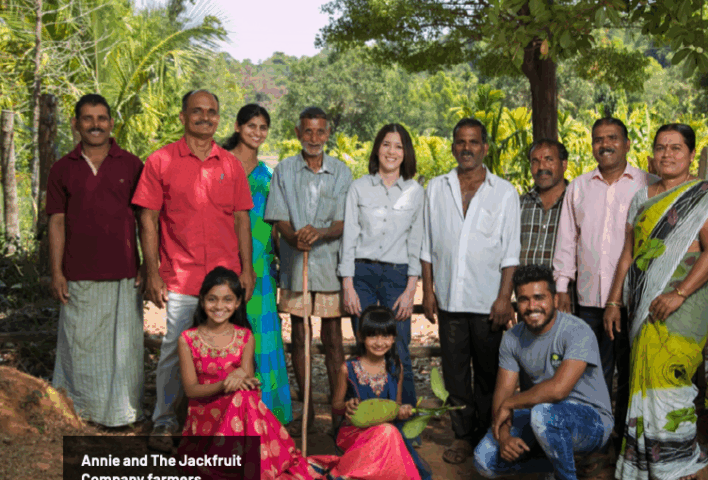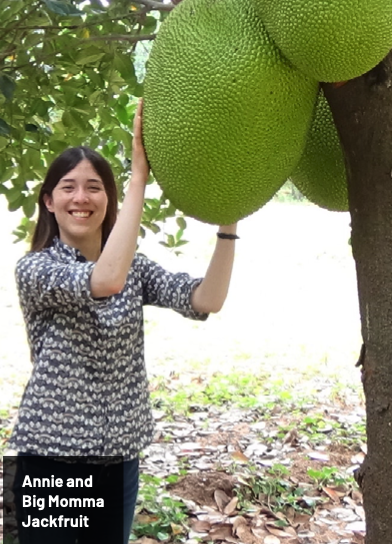The Jackfruit Company

A modern success story
We speak with Adrian Beale, the founder of Buckley & Beale, a company that imports and distributes jackfruit products in the UK. Adrian tells us about the history, benefits and versatility of this tropical fruit that can mimic the texture and flavour of meat. (the is an excerpt from a much longer article)
As a Society we keep a close eye on food trends and always look to highlight new products coming to market. We met up with Adrian Beale from Buckley & Beale and were intrigued with his story and product. With the growth in meat substitutes on our shelves, it’s great to see a simple wholefood product like jackfruit being marketed strongly to catering providers across the UK. And what’s even better is that it’s available for anyone to buy via Amazon. Our own cookery school team have cooked a few recipes using this jackfruit and it’s fair to say they loved it! As a result we’re looking to incorporate it more into our classes.
So, read on and delve into the fascinating world of jackfruit!
A simple question to kick off – what exactly is jackfruit?
Jackfruit has been around for centuries. Archaeologists have learned that it was cultivated in India around 5000 years ago, possibly more, but is also cultivated across South East Asia and now found across the Caribbean and South America.
The jackfruit tree produces the largest fruit in the world. People often think they are perhaps the size of an avocado or maybe a pineapple, but these things are huge and can be up to 100lbs and nearly three feet in diameter. The jackfruit tree itself is highly prized across India and Bangladesh, with the wood from the tree used to build houses, furniture, Hindu ceremonial seats, Buddhist statues and even musical instruments. The Bengali word for jackfruit translates as ‘tree mutton’ and while it has recently become known here in the UK as something of a trendy meat replacement, it’s actually been eaten in place of meat for thousands of years.
In Kerala, India, jackfruit just grows everywhere. It’s in people’s back gardens, it’s along railway lines, it’s in woods and jungles and so on, but it’s well known over all of India, Bangladesh, and other areas of Asia with a tropical climate. In countries where it’s grown, jackfruit is as familiar to people there as the humble potato is to us here in the UK. Indeed, many Indian farmers find it hilarious that we in the UK now find it trendy and exciting, when for them it’s a rather everyday common plant!
And why is it so popular as an ingredient in dishes?
Jackfruit is virtually unique in that it can be used in both ripe and unripe form. Unripe jackfruit is incredibly fibrous and has only a very mild flavour, and this is where its use as a substitute for meat such as pork or beef has become more commonplace in the past few years. These strands readily absorb sauces, seasonings, spices and because the strands themselves have very little flavour of their own, they take on the flavour of whatever they’re being cooked with. They also provide a fibrous meaty texture, which can appeal to both meat eaters and non-meat eaters alike. Jackfruit makes a fantastic substitute for those who have chosen to cut out meat, but miss the look and texture. When cooked it goes from white to brown, looks like meat, has the texture of slow-cooked meat and depending on what you season it with, it can taste meaty too. In contrast, the ripe jackfruit is yellow and very sweet, with a flavour that can be compared to Juicy Fruit chewing gum! In fact, some people believe that Wrigley based the flavour of the gum on jackfruit. The ripe fruit is commonly used in pastries, ice creams and smoothies.
Tell me more about The Jackfruit Company.
I love the backstory to The Jackfruit Company, as it’s the most sincere and authentic one I’ve ever come across. Since she was a young girl, Annie Ryu, the founder, had always wanted to help people, and in her mind that was through medicine. She went to study medicine at Harvard, with the goal of moving out to India with her brother to set up a maternal and child healthcare program with her brother, Alex. It was while in India that she encountered jackfruit on a street vendor’s stall and was immediately intrigued by this enormous green, spiky fruit that she had never seen before. She was fascinated, not so much by the fruit itself but how neither her, nor any of her friends and family had heard of it, and yet here is the world’s largest fruit, being eaten every day by people all over India. It’s so prevalent in some regions across India and Bangladesh, with one tree producing up to four tonnes of jackfruit, that people simply can’t eat it all, with most sadly going to waste.
Once she had learned more about the nutritional benefits of jackfruit, she realised she could make a difference on a huge scale, and quite by accident became an entrepreneur. She had to establish a completely non-existent supply chain from scratch, but now The Jackfruit Company purchases fruit from nearly 2,000 farming communities. For many of these farmers it has provided an income that they would never have earned locally, and provided us with one the planet’s most nutritious, versatile, and sustainable ingredients. I see very few businesses these days start with that level of authenticity and sincerity.
Interestingly, the company also doesn’t lead with a strong vegan or vegetarian message. Instead, the pitch is that here is this natural ingredient you’ve probably never heard of, and that if you want to make something with less or no meat, you can do it in an amazing, natural, healthy, and sustainable way.

What about sustainability?
Almost no-one I meet realises how sustainable jackfruit is. It’s evolved to be both drought resistant and pest resistant. This means it requires no artificial irrigation and needs no fertilisers or pesticides. By any definition, that’s about as sustainable as it’s possible to get.
What can you tell me about jackfruit’s nutritional content?
Jackfruit is definitely best known for its fibre content, with pouched jackfruit containing 9.5g of fibre per 100g. It has no fat, no sugars, and no salt, and is naturally gluten free. A lot of people could do with eating more fibre, and jackfruit is an excellent way of adding it to a multitude of dishes. This is particularly useful for some of our healthcare customers such as hospitals and care homes, where there is the need to increase the fibre content of meals, but within dishes familiar and acceptable to their customers. Meals like stews, curries, shepherd’s pie, and casseroles.
How do you find people react to the idea of jackfruit in the UK?
I still meet one or two people that have never heard of it, and over the years I’ve even met chefs that have said, ‘…oh yeah, I’ve heard of jackfruit. It’s been designed to be like pulled pork’! When I think back on it, jackfruit had the misfortune of becoming more well known around the same time as processed meat alternatives were hitting the market, and because they’d never heard of it before, people often assumed it was a product and not an actual fruit. Most people’s first experience ofjackfruit is also in a finished dish and not hanging from a tree, so it’s an understandable assumption. This hasn’t done jackfruit any favours and it is still often lumped into the same conversation as processed alternatives. This can often lead to, in my opinion, unfair comparisons. On the one hand we have processed products making big claims about being able to replicate meat, whereas we’re simply saying here’s an excellent natural ingredient that just so happens to have a similar look and texture to meat when cooked. In some ways I think it’s a shame we couldn’t ‘launch’ jackfruit as though it was a product, as I do find a lot of my work on a day-to-day basis is undoing assumptions, explaining that not all jackfruit is the same, and raising awareness for what it really is.
And finally, what are your plans for the future?
Given everything I now know about it, I see no reason why there can’t be at least one jackfruit dish in every school, college, university, care home, and hospital in the country. The entire food industry is under huge pressure to find solutions to improve the quality, nutrition, and sustainability of the meals that it produces. And yet, ironically, here’s the world’s largest fruit hiding in plain sight offering a natural solution that ticks all those boxes and more. We’d love to be a small part in making that happen.
Why don’t you head over to our recipes and try this Jackfruit Flatbread Wrap?!

This is feature from a longer article that appeared in a prior issue of our members’ magazine The Pod.
To enjoy articles like this, please sign up to become a member of the Vegetarian Society and get your copy of our next magazine and other benefits! Joining us costs as little as £3 a month.
More information
To find out more about the No Dig method, or for further information, go to: www.charlesdowding.co.uk
